Richard Rose
Newspaper Articles
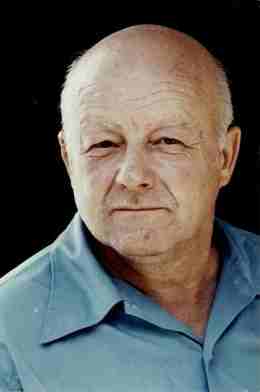
'Absolute' Philosopher Doesn't Want Crowd
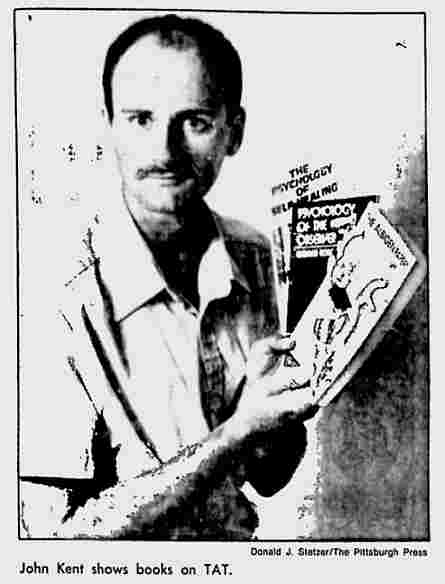
'Absolute' Philosopher Doesn't Want Crowd at Weekend Seminar
The Pittsburgh Press - August 6, 1983
By Jerry Sharpe, Press Religion Editor
Richard Rose, a writer and philosopher, offering a "Psychology of Self Healing" conference in Benwood, W.Va., this weekend, is a lot different from most people who organize events.
Rose - would you believe it? - doesn't want huge crowds of people to attend. Instead, he hopes just a few people who are really interested will show up.
If that sounds out of step with the world, Rose wants it to. He doesn't want to be in step with the world because he considers it out of touch with "truth."
Rose, founder of the TAT Foundation (Truth And Transmission) is a philosopher who says he has spent most of his 66 years searching for truth.
He is a sincere and dedicated man who is convinced that most people bumble through life without finding themselves.
The seminars he holds are aimed, he said, at "simply getting people to think ... to search for themselves."
Once a person finds himself or herself, a whole world of knowledge is unlocked leading the person eventually to what Rose calls "the Absolute," or an infinite state.
Is the absolute another word for God?
"I hesitate to use the word 'God' because it has been misused so much by people," he said. "Religious people, including every clergy person I've known, don't seek the absolute or search for the truth. What they do is use God to manipulate other people."
Does TAT promise a good life here and eternal life afterwards?
"I urge people to think about their lives and find themselves. I don't use the word 'good.' Good and bad are only relative terms. As to eternal life, I'm convinced that nobody dies. There is definitely eternal life. But there isn't any physical place such as heaven or hell. We have eternal life, but I can't imagine what it will be like ... what form it will have."
Rose began his search for life's deeper meaning when at the age of 12 he entered St. Fidelis, a Capuchin seminary at Herman in Butler County. But at 17, he left disillusioned, convinced "they didn't know any more about God than I did."
In the years that followed, he researched virtually every form of religion and philosophy he heard of. He looked into science, mathematics and any form of learning written in libraries. And he meditated and searched for what seemed like the ever-elusive thing he calls "truth."
Finally, reaching the age of 32, [actually 30] he began to wonder if he should give up the spiritual chase. And then, while in a hotel in Seattle, Wash., he suddenly experienced what he describes as "Feeling myself go out of my body and being able to look back and see it lying there ... feeling myself floating out the window and rising over the mountains from where I could look down and see the masses climbing, pushing and clawing at each other. And I was among the masses doing the same."
His experience convinced him that he had reached what he calls "the absolute."
And he wrote "Three Books of the Absolute," "The Albigen Papers," and "Psychology of the Observer." He advertised the books, and he began to hold seminars.
Eventually, people started to show up at his farm near Wheeling, W.Va., wanting to meet him. He was asked to speak at the Pittsburgh Theosophical Society and at Kent State university in Ohio, among other places.
While speaking at California State College in Northridge. Calif., Rose impressed a graduate psychology student named John Kent who eventually became so impressed that he moved to the Tri-State area to be near Rose.
Now living in Beechview and working as a mental health counselor at Bellaire City Hospital, Bellaire, Ohio, Kent is part of a group of "students" who conduct TAT Foundation seminars monthly - open to the public - at Pittsburgh National Bank's meeting rooms at Fifth and Craig, Oakland. Advanced seminars are held at a private home and are open only to serious students, Kent said.
He believes TAT has not only helped him find himself but also helps him deal with patients at the hospital.
"It's not a religion," Kent said. But it deals with religion as well as all other forms of knowledge. I was born a Jew, but my faith didn't give me the answers. A lot of Christians have told me the same. Most of our TAT group is former Jews and Catholics who didn't get answers to truth in their religions.
"There's an attitude around among lots of young people that there's nothing to live for. Rose taught about a moral life and pointed out the error of the degenerate way of thinking such as finding escape in drugs, booze and the like. TAT is a philosophy of finding peace and answers through self-realization.
"We don't use the word God, but there is a greater power than ourselves. We search to become part of it. To put it best, a wise man once said, 'We're rivers trickling around lost, longing to get back to the sea. When a river finally flows into the sea. it doesn't come out again, does it?'"
The TAT seminar, which will continue through tomorrow at Rose's farm in Benwood, will include such speakers as Robert Ayers, biochemistry professor at Holliston College in Massachusetts, Dr. Irving Goodman, a psychology professor at West Virginia University, and Rose.
Information about Pittsburgh meetings may be obtained by calling Kent at 343-1907 in the evenings.
"Mirrors of the Soul" will be discussed at a seminar open to the public at 7 30 p.m. Wednesday at the Pittsburgh National Bank building, Fifth and Craig, Oakland.
Article Images
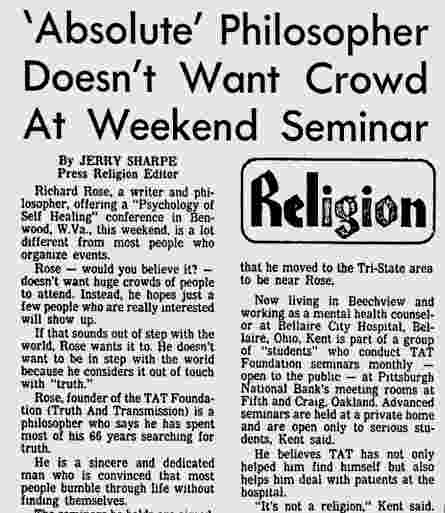
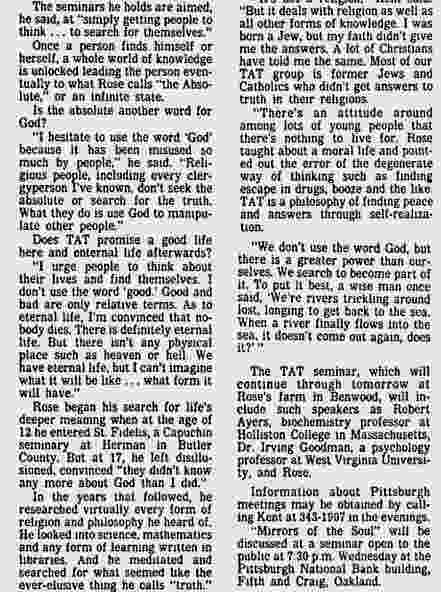
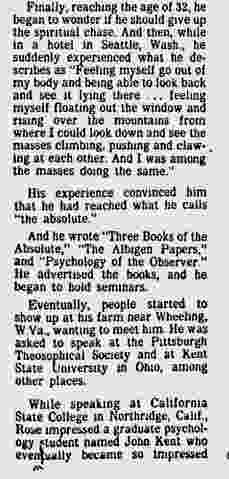
All images (original and optimized): images/